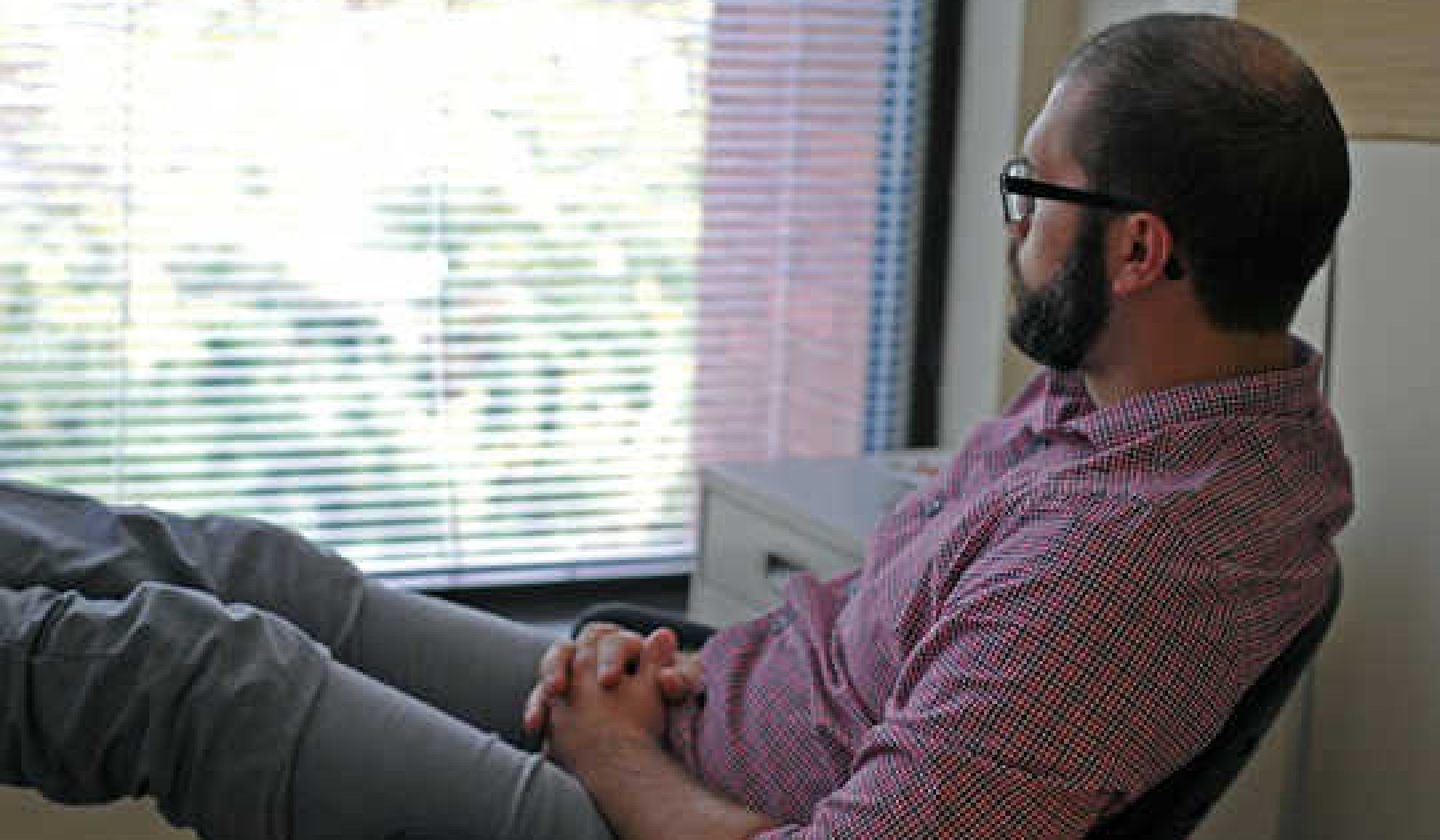
I'm giving myself a birthday present this year. After 25 years of working with a large corporation, I have decided to leave. Why? I discovered that living in the "corporate" world has been living in a culture that is not unlike a battlefield.
In the corporate world, I was programmed to believe that we were all soldiers in the field, that we were at war. Our enemies were our competitors, whose main intent was to annihilate you. Keeping the "company" alive was seen as a struggle that required us to be military strategists.
We took on an outlook of the world
that is a "me" versus "them" viewpoint.
The problem is that when we organize our lives around military metaphors and words such as: war, battle, tactics, struggle, competition, winning, enemies, objective, power, command, control, willpower, etc., we may fall into a paranoid view of the world.
Living For The Office and For The Profit
When men live within the context where their major function is to do battle — economic or literal — the distinction becomes blurred and they are shaped by the logic of the warrior psyche. The number one objective in corporate life has been to create profit; in the case of my company, primarily for its stockholders.
There is nothing wrong with the desire to be profitable. However, in the desire to create or increase profits on the corporate battlefield and for every incremental dollar that is gained, an incremental piece of "us" was lost. In the tunnel vision that was used to make more money for the corporation, we began to identify ourselves as human beings to the success or failure of the "corporate" society. We began to ally ourselves too closely with a creation whose goals and objectives in the meaning of our lives was illusory at best. We began to render to corporations the type of loyalty that was previously reserved for God and family.
The corporate self-evaluation of itself as being a "service" organization, or of being one big "happy family", or being dedicated to the "highest" values in society, should no more be accepted blindly than the propaganda of any nation, tribe, or political party. The corporate driving mechanism has been to win...and "win at any cost". In the world of winning, there was only one driving force...profit! Every activity was shaped toward that end. Under the facade of enlightened personnel policies and politeness you may find the iron fist of competition and warfare.
For those of us who have lived in this environment for a long time, there was the increasing problem of stress and burnout. What we thought was basically a psychological problem, is really a philosophical one. In order to "make a living" so we can survive, we gave up the notion of having a sense of significance that is gained only by "creating" something we feel is of lasting value — a child, an invention to help clean up the air, a farm, or a book. When the requirements of our work do not match our creative potential, we don't burn out — we "rust out".
Losing Your Self, Your Passion, Your Compassion
 In succumbing to the blind objective of making ever higher profits for our stockholders, we, as soldiers on the battlefield, began to lose two things — our passion and compassion. We took on an outlook of the world that is a "me" versus "them" viewpoint. We became unable to leave the corporation behind when we left the office. Instead, we took it into our homes and our families. We saw members of the family in terms of their strengths and weaknesses, in terms of our perceptions of whether they will be able to survive on the battlefields that we have created. What was once "unconditional" love when our marriages began and when our careers began...became conditioned on the ability to compete and survive.
In succumbing to the blind objective of making ever higher profits for our stockholders, we, as soldiers on the battlefield, began to lose two things — our passion and compassion. We took on an outlook of the world that is a "me" versus "them" viewpoint. We became unable to leave the corporation behind when we left the office. Instead, we took it into our homes and our families. We saw members of the family in terms of their strengths and weaknesses, in terms of our perceptions of whether they will be able to survive on the battlefields that we have created. What was once "unconditional" love when our marriages began and when our careers began...became conditioned on the ability to compete and survive.
If you doubt this, just go down the street to any little league, basketball, or soccer games where parents are present. Watch the interaction of these adults with their children; and especially their reaction to the mistakes their children may make. Or how about the way we react to our child failing a class in school. Do we act out of compassion or disbelief or denial?
What happens in the corporate battleground was transferred directly to the viewpoint of our own family. Winning is the name of the game. And if they don't win, if they don't make the grades, if they don't live up to our idea of "success"... we withhold the same thing from them that is withheld from us in the corporate structure — love and compassion.
The same thing happens to our marriage. What started out as a love that was so full of "passion" became a marriage that was based upon both partners sense of success of the other partner. If the female spouse perceived that her husband was a "failure" or a "loser", the man feels a sense of worthlessness and emasculation. He not only loses his masculinity, but he looses his love and his passion.
The stakes of his "not winning" in the corporate office are very high in the home. If the male spouse perceives that his wife did not measure up to the way a soldier should be treated when he returned home from the battle, he learned that her punishment should be non-communication, an affair, drinking, or physical abuse of her. Where once there was love and compassion, there is now an extension of the corporate culture — judgment and punishment based on success or failure.
Living Detached from our Innate Humanity
Where did these ideas come from? How is it that we have created a view of our world that is so devoid of our innate humanity? I believe the answer is simple. In our desire to create more wealth for the corporation, we naturally wanted to create more wealth for ourselves. In creating more wealth, we create for ourselves and stockholders ever higher expectations of having and wanting more. This ever increasing spiral of higher expectations is the opiate that dulls our sensitivity and our relationships with each other. The sinister side of always wanting more becomes a self-feeding addiction that never stops until we finally realize that it is not creating happiness in our lives.
Getting lost in the world of desire has been easy because that's what our corporate culture has created. Their "raison d'être" (reason for being) is to tell us and sell us what we need in order to "survive" in this society. Our advertising and media has been based solely on fulfilling desires and fantasies that have absolutely nothing to do with relating to each other on a loving, nurturing and fulfilling level.
What was the last commercial you saw that had as its premise the tenderness and connectedness of other human beings without having to sell something in order to have it? We are being taught that love is a function of first consuming something or giving something to someone — there is a caveat for that love — it's called a "bribe".
Seeking The Truth of Our Existence
The quest in our lives should be to seek the truth of our existence. It should be based on the premise that we are all in this together — this life of ours. We need to allow our hearts to tell and inform us that the meaning of our lives is not about having more but being more to ourselves and others. We need to learn compassion, first for ourselves, then for others. As we begin to open our hearts and forgive ourselves, we can then relate to all other souls and beings on a more compassionate and loving level.
We need to become aware that what is given to us in the papers and over the airwaves is poisonous to our spirit as it robs us of our love and energy. Additionally, it feeds us false images of growth, keeps us from discovering the love that lies within us and separates us from ourselves.
We should not seek to destroy the corporate world; we should seek to change its direction. We need to say the same thing to them that we've said to Congress..."stop the warfare". Create a world where we teach caring for each other, our common search for meaning and love. Unite people in the idea that family and community are the most important values; and not conspicuous consumption and selfishness.
Teach charity to each other, as you give to charities, as a way of showing "corporate responsibility". Our first responsibility should be to each other in nurturing the growth of the soul and the love of one another.
Those of us who can see a different world possibility need to get involved in not just talking about it but "living" it every day. Changing the world is the most creative and meaningful thing we can do, and it is done solely by bearing our hearts to our fellow man.
There is not one single thing in life worth having or owning that is more valuable than the meaning of the words "I love you" said to another human being. In the act of becoming, our gift to ourselves and others is unconditional love. Eventually, the corporate world will catch the fever and jump on the bandwagon — even if they won't provide the vehicle.
Recommended Book:
The Power of Compassion : Stories That Open the Heart, Heal the Soul, and Change the World
by Pamela Bloom (editor).
 In stories as gripping as they are inspirational, it becomes abundantly clear that intentional acts of kindness are nothing short of life-changing -- and sometimes even world-changing. The writings collected here also prove that while our compassion aids others, it is also a mighty force that opens our own hearts. Here more than forty, first-person stories by the likes of John F. Kennedy, Jr., Pema Chodron, Barbara Brodsky, Thich Nhat Hanh, and more...
In stories as gripping as they are inspirational, it becomes abundantly clear that intentional acts of kindness are nothing short of life-changing -- and sometimes even world-changing. The writings collected here also prove that while our compassion aids others, it is also a mighty force that opens our own hearts. Here more than forty, first-person stories by the likes of John F. Kennedy, Jr., Pema Chodron, Barbara Brodsky, Thich Nhat Hanh, and more...
For more info, or to order this book. Also available as a Kindle edition.
 About The Author
About The Author
Tom Borin was born in Detroit, Michigan and has retired from operating a MacDonald's in the Miami area for over 25 years.
Related Books
at InnerSelf Market and Amazon






















